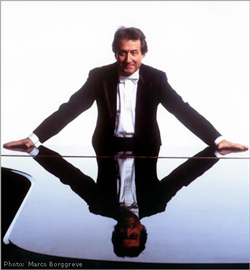by Mike Telin

The concerts also include Rachmaninoff’s Rhapsody on a Theme of Paganini and mark the return of famed Austrian pianist Rudolf Buchbinder to Severance Hall for the first time since 1998. We spoke to the fascinating pianist by telephone at his home in Vienna.
We talked about a few of his hobbies like collecting movie DVDs and scores of Beethoven, and his recent release of the five Beethoven concertos with the Vienna Philharmonic on DVD/Blu-ray as well as his secret to a well balanced life. We began by asking him why he thinks Rachmaninoff’s Rhapsody is so wildly popular?
Rudolf Buchbinder: First of all for me, this piece is one of the greatest variation compositions. You have the Goldberg, the Diabelli, and Paganini by Rachmaninoff. It’s a really great piece. It was one of the first piano concertos I studied at age 14 and the amazing thing is all of the Russian conductors that I work with all want to play Rachmaninoff with me. Not Beethoven or Brahms.
The funny thing that people think when they listen to Rachmaninoff — especially the second concerto or these Paganini variations because of the one variation — is that it sounds like Hollywood. But this has nothing to do with Hollywood, it is Russian folk music.
Mike Telin: But the variation you are referring to, No. 18, audiences all over the world join in a collective Ah!
RB: Yes and a similar thing occurs in the Mozart C major concerto, the “Elvira Madigan”. When you start the second movement in a concert you can see the big surprise on the face of the public. What? This is by Mozart? How is that possible? It’s always fantastic to see this reaction.
MT: You never get tired of that?
RB: No, never! Not with either piece.
MT: I’ve enjoyed your DVDs of the Beethoven concertos with the Vienna Philharmonic. Do you find that conducting from the keyboard gives you a little more freedom as a soloist?
RB: Yes it does. But this whole thing about conducting from the keyboard, I’m not the first. Mozart did it, Beethoven did it, a lot of people have done it.
For me, these concerti are big chamber music. And in the rehearsal and in the concert I only give a pulse, with the lips or the eyes. But I do love doing it although I don’t want to do it all year long. From time to time it’s very exciting, especially with very good orchestras. I did it [in Japan] with the New York Philharmonic and a few weeks ago with the Dresden Staatskapelle.
MT: I’ve enjoyed reading about your hobby of collecting scores of Beethoven’s music.
RB: I have thirty-eight different scores of the complete piano sonatas. Over 90% are the first edition. I bought some of them in the United States. There’s a very good music and antique shop in New York, and the last thing I bought there was a first edition of opus 101, which is very rare. It is fascinating and I read it like a book. [laughing] Like a crime book. It’s fantastic because it is my hobby and my life.
MT: When did you first start collecting them?
RB: Twenty-five years ago, I suppose. But when you start it’s like a little snowball and it keeps getting bigger and bigger as it goes down the mountain.
MT: Yes, and then you have to buy a bigger house.
RB: Oh, it doesn’t matter if you buy a bigger house because in a short time it will be too small again.
MT: Is there a story or something of great surprise you’d like to share about any of the scores?
RB: Yes. I have the first edition of the fifth Beethoven concerto and I also have the facsimile of the autograph. Then I discovered that the main mistakes are in the first edition. Which means all of the upcoming editions are copying from the first edition, not the autograph. The newer editions are after the autograph. This was the biggest discovery and this happens all the time.
MT: I understand that you don’t listen to recordings of yourself?
RB: No, not to my own, I listen to Oscar Petersen, Frank Sinatra and George Shearing.
MT: So you’re a jazz fan?
RB: Yes! I knew Oscar Petersen and we wanted to do a tour together in South America. But if we had played together on stage I would have lost completely, because he played classical music very well, but I am far away from playing jazz the way he did. And the recording with George Shearing and Nat King Cole is fantastic and one of my favorites.
MT: Is it true that you own four thousand DVDs of movies?
RB: Yes and I’m collecting two different kinds of movies. The first are movies by the important actors, actresses and directors including Abbott and Costello, Fellini as well as Charlie Chaplin who is one of the greatest genius in the last century for me. And many others.
The second are the important classical movies and silent movies. I have all of the silent movies of Hitchcock. And silent movies of John Wayne. I’m crazy! But these are all hobbies where I can stay at home.
MT: You have been so much fun to talk to. And you’re obviously a person with a well-balanced life: What is your secret?
RB: My secret is that you should never mix your profession with your private life. We are all Dr. Jekyll and Mr. Hyde. For me, Mr. Hyde is at home and Dr. Jekyll on stage.
Published on ClevelandClassical.com March 4, 2014
Click here for a printable version of this article.


